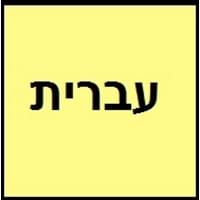Hebrew vs Czech
Countries
Israel
Czech Republic, European Union
National Language
Israel
Czech Republic
Second Language
Israel
Not spoken in any of the countries
Speaking Continents
Africa, Asia, Europe
Europe
Minority Language
Poland
Austria, Croatia, Germany, Slovakia
Regulated By
Academy of the Hebrew Language
Institute of the Czech Language
Interesting Facts
- The original language of Bible is Hebrew.
- The men and women use different verbs in hebrew language.
- The Czech language was known as Bohemian as early at 19th century.
- In czech language, there are many words that do not contain vowels.
Similar To
Arabic and Aramaic languages
Polish, Slovak and Sorbian
Derived From
Aramaic Language
Not Available
Alphabets in
Hebrew-Alphabets.jpg#200
Czech-Alphabets.jpg#200
Writing Direction
Right-To-Left, Horizontal
Left-To-Right, Horizontal
Thank You
תודה (Toda)
děkuji
How Are You?
מה שלומך? (ma shlomxa)
Jak se máš?
Good Night
לילה טוב (Laila tov)
dobrou noc
Good Evening
ערב טוב (Erev tov)
dobrý večer
Good Afternoon
אחר צהריים טובים (Achar tzahara'im tovim)
dobré odpoledne
Good Morning
בוקר טוב (Boker tov)
dobré ráno
Please
בבקשה (bevekshah)
prosím
Sorry
סליחה! (Slicha)
litovat
Bye
להתראות (Lehitraot)
sbohem
I Love You
אני אוהבת אותך (Ani ohevet otcha)
Miluji tě
Excuse Me
בבקשה!
promiňte
Dialect 1
Ashkenazi Hebrew
Chod
Where They Speak
Israel
Chodsko, Bohemia
Dialect 2
Samaritan Hebrew
Lach
Where They Speak
Israel, Palestine
Czech Silesia, Hlucin, Northeast Moravia
Dialect 3
Yemenite Hebrew
Moravian
Where They Speak
Israel
Czech Republic, Czech Silesia, Moravia, Slovakia
How Many People Speak
Not Available
Speaking Population
Not Available
Second Language Speakers
Not Available
Native Name
עברית / עִבְרִית (ivrit)
čeština / český jazyk
Alternative Names
Israeli, Ivrit
Bohemian, Cestina
French Name
hébreu
tchèque
German Name
Hebräisch
Tschechisch
Pronunciation
[(ʔ)ivˈʁit] - [(ʔ)ivˈɾit]
Not Available
Ethnicity
Not Available
Czechs
Origin
1000 BC
9th Century
Language Family
Afro-Asiatic Family
Indo-European Family
Branch
Canaanitic
Western
Early Forms
Biblical Hebrew, Mishnaic Hebrew, Medieval Hebrew, Hebrew
Proto-Czech, Old Czech
Standard Forms
Modern Hebrew
Standard Czech
Signed Forms
Signed Hebrew
Czech Sign Language
Scope
Individual
Individual
ISO 639 6
Not Available
Not Available
Glottocode
hebr1246
czec1258
Linguasphere
12-AAB-a
53-AAA-da
Language Type
Living
Living
Language Linguistic Typology
Subject-Verb-Object, Verb-Subject-Object
Not Available
Language Morphological Typology
Fusional, Synthetic
Fusional, Synthetic
Hebrew and Czech Language History
Comparison of Hebrew vs Czech language history gives us differences between origin of Hebrew and Czech language. History of Hebrew language states that this language originated in 1000 BC whereas history of Czech language states that this language originated in 9th Century. Family of the language also forms a part of history of that language. More on language families of these languages can be found out on Hebrew and Czech Language History.
Hebrew and Czech Greetings
People around the world use different languages to interact with each other. Even if we cannot communicate fluently in any language, it will always be beneficial to know about some of the common greetings or phrases from that language. This is where Hebrew and Czech greetings helps you to understand basic phrases in Hebrew and Czech language. Hebrew word for "Hello" is שלום (Shalom) or Czech word for "Thank You" is děkuji. Find more of such common Hebrew Greetings and Czech Greetings. These greetings will help you to be more confident when conversing with natives that speak these languages.
Hebrew vs Czech Difficulty
The Hebrew vs Czech difficulty level basically depends on the number of Hebrew Alphabets and Czech Alphabets. Also the number of vowels and consonants in the language plays an important role in deciding the difficulty level of that language. The important points to be considered when we compare Hebrew and Czech are the origin, speaking countries, language family, different greetings, speaking population of these languages. Want to know in Hebrew and Czech, which language is harder to learn? Time required to learn Hebrew is 44 weeks while to learn Czech time required is 44 weeks.





